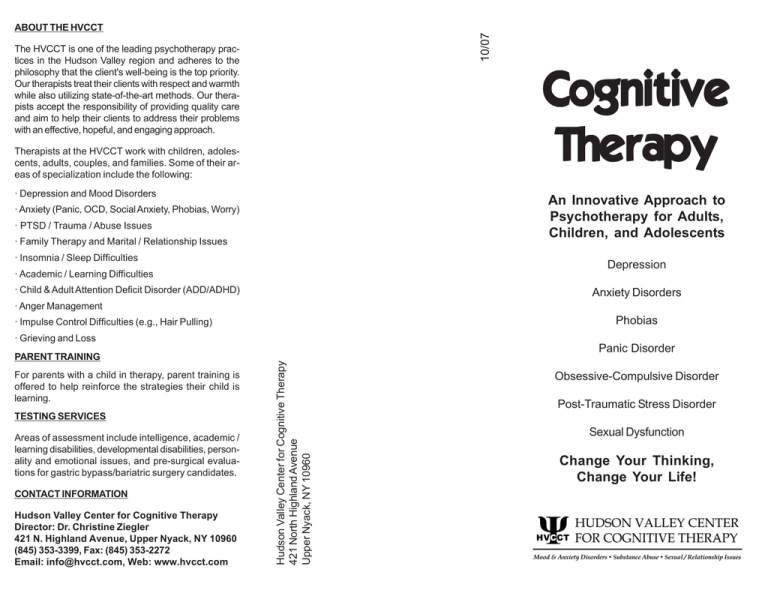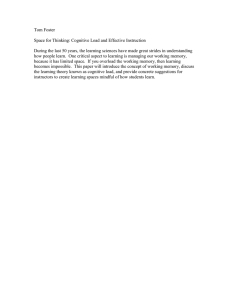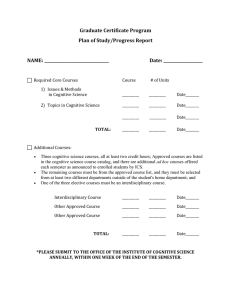Hudson Valley Center for Cognitive Therapy
advertisement

10/07 ABOUT THE HVCCT The HVCCT is one of the leading psychotherapy practices in the Hudson Valley region and adheres to the philosophy that the client's well-being is the top priority. Our therapists treat their clients with respect and warmth while also utilizing state-of-the-art methods. Our therapists accept the responsibility of providing quality care and aim to help their clients to address their problems with an effective, hopeful, and engaging approach. Therapists at the HVCCT work with children, adolescents, adults, couples, and families. Some of their areas of specialization include the following: · Depression and Mood Disorders Cognitive Therapy An Innovative Approach to Psychotherapy for Adults, Children, and Adolescents · Anxiety (Panic, OCD, Social Anxiety, Phobias, Worry) · PTSD / Trauma / Abuse Issues · Family Therapy and Marital / Relationship Issues · Insomnia / Sleep Difficulties Depression · Academic / Learning Difficulties · Child & Adult Attention Deficit Disorder (ADD/ADHD) Anxiety Disorders · Anger Management Phobias · Impulse Control Difficulties (e.g., Hair Pulling) · Grieving and Loss For parents with a child in therapy, parent training is offered to help reinforce the strategies their child is learning. TESTING SERVICES Areas of assessment include intelligence, academic / learning disabilities, developmental disabilities, personality and emotional issues, and pre-surgical evaluations for gastric bypass/bariatric surgery candidates. CONTACT INFORMATION Hudson Valley Center for Cognitive Therapy Director: Dr. Christine Ziegler 421 N. Highland Avenue, Upper Nyack, NY 10960 (845) 353-3399, Fax: (845) 353-2272 Email: info@hvcct.com, Web: www.hvcct.com Panic Disorder Hudson Valley Center for Cognitive Therapy 421 North Highland Avenue Upper Nyack, NY 10960 PARENT TRAINING Obsessive-Compulsive Disorder Post-Traumatic Stress Disorder Sexual Dysfunction Change Your Thinking, Change Your Life! WHAT IS COGNITIVE THERAPY? WHAT IS COGNITIVE THERAPY? (CONTINUED) ADVANTAGES OF COGNITIVE THERAPY Cognitive Therapy is one of the most state-ofthe-art and extensively researched methods of psychotherapy. The word "cognitive" refers to how one thinks or feels at a particular moment. A central idea in Cognitive Therapy is that emotions and feelings are significantly related to thinking. Perception and interpretation of events powerfully affect emotional, behavioral, and physical responses. Emotional disturbances (e.g., anxiety, depression) are seen as a result of distorted ways of interpreting life experiences. This method has helped thousands develop more effective coping skills that can be used in everyday life. Furthermore, because clients learn selfhelp techniques, they are often able to maintain the benefits of their treatment well after therapy is complete. Proven Effective: Hundreds of research studies demonstrate that Cognitive Therapy is an effective treatment. For many disorders, Cognitive Therapy is a more effective treatment than other forms of psychotherapy and equivalent to medication. The overall goal of Cognitive Therapy is to help clients restructure their thinking. With direction and support, clients can learn to identify and challenge their typical ways of interpreting events and viewing themselves and the world around them There are three broad phases of Cognitive Therapy. The first is helping clients become aware of exactly what they are thinking when they are in distress. Once thoughts are identified, the second phase is to examine the validity and accuracy of the thoughts and perceptions. Typically, negative thoughts are incorrect or are an exaggeration of the truth. The third phase is to challenge negative thoughts by responding back to them with a more accurate, realistic way of thinking. Clients are taught to utilize this process outside of therapy sessions. It is important to realize that Cognitive Therapy is not "positive thinking." Instead, the point of Cognitive Therapy is to view life's problems in a realistic perspective. The therapy is structured, problem-focused and present-oriented. While it is important to understand how childhood experiences can affect current beliefs about the self and others, the focus is on present day difficulties and providing clients with "tools" to manage their problems. APPLICATIONS OF COGNITIVE THERAPY Cognitive Therapy has been shown to be effective for: · Depression Short Term: Cognitive Therapy aims to achieve results as quickly as possible. Most clients experience positive changes in approximately 12-25 sessions. The course of treatment tends to be considerably shorter than for traditional approaches to psychotherapy, as it is structured, problem-focused, and goal-oriented. · Anxiety, Phobias, and Fears · Panic Attacks · Social Phobia · Obsessive-Compulsive Disorder · Chronic Worry · Post-Traumatic Stress Disorder · Interpersonal Conflict, Marital Problems · Eating Disorders, Weight Control · Stress-Related Medical Problems · Headaches · Insomnia · Diabetes · Irritable Bowel Syndrome · Chronic Pain · Self-esteem · Procrastination · Anger Management Cost-Effective: The active and focused psychotherapeutic approach makes the cost of treatment less expensive than other forms of therapy. The focus on skill building and client independence minimizes the length of treatment and reduces the risk of relapse. Lasting Results: Cognitive Therapy emphasizes many practical strategies that can be used when therapy ends to cope with life more effectively. Most clients in Cognitive Therapy maintain their gains because they learn to modify distortions in thinking which are associated with their problems. FREE PHONE CONSULTATION Dr. Christine Ziegler, Director of the HVCCT, is happy to discuss your specific concerns and explain how Cognitive Therapy may benefit you. Please call (845) 353-3399 x 12 to learn more about our services or to schedule an initial appointment with one of our therapists.



